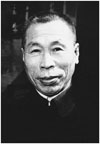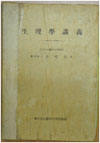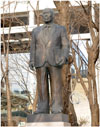Myung-Sun Kim was born in Jangyeon County of Hwanghae Province on October 17, 1897, the first son of Byung-Gyu Kim and In-Ae Kwak. Given by his father, “Myung-Sun” means “shout the goodness widely,” and he certainly lived up to the name until he was laid to rest at the age of 85 in April 1982 (Fig. 1).
Being strictly fair and faithful to his principles, for which he was considered inflexible, Kim enjoyed challenges and paving new roads, rather than taking what was given; moreover, he spared no effort to prevent causing trouble to others. Reflected in the words of Jesus, “Let us not become weary in doing good, for at the proper time we will reap a harvest if we do not give up,” (Galatians 6:9), his life left an indelible mark in the world. He devoted his whole life as an educator and leader to the medical school at Severance Hospital, helping to make it what it is today.
Myung-Sun Kim as an educator
Upon graduating from Severance in 1925, he was assigned as an assistant and started to deliver lectures on physiology in the fall semester of the same year. His physiology class was not limited to simply teaching the subject; he put emphasis on the basic spirit required as a doctor and leader (Fig. 2). His passions for teaching and eccentric behavior are still talked about today. As an anecdote thereof, his students coined a new physical condition, “Myungsun phobia,” alluding to phobia of his strictness. With regard to the symptoms, his students said, “An increase in heart rate, irregular breathing, hypotension, and facial pallor upon meeting Dr. Kim, and running from him is the sole treatment.”1 Despite his strictness, he was committed to getting to know his students each year, memorizing all of their names, as well as their family and economic situations. Whenever freshmen entered the school, he read their personal information again and again late into the night until it was memorized. Although his strictness was sometimes uncomfortable for his students, they could not help but be deeply moved by his attention to and affection for their personal circumstances. For needy students, he paid tuition on their behalf; for those who missed a meal, he shared meals; and for those who wished to continue their studies, he provided a chance to go abroad. Facing troubles, his students used to visit him to discuss them, despite their fear of facing him. As such, he had the ambivalent characteristics of a strict father and a merciful mother. His sincere attitudes toward his students amaze us even now.2
His teaching greatly influenced his student's ideas and attitudes, and he provided an example of what doctors ought to be as a leader. He encouraged his students to have faith in Jesus Christ and lived his own life as a devout Christian. Despite being a professor at the best medical school in Korea, he lived a humble life and dedicated nearly all of his time to teaching and instructing students.
Myung-Sun Kim as a researcher
Dr. Kim used to say, “I am not good enough with my research, having little academic contribution to the medical world.” However, he was given little time to immerse himself effectively in research and faced poor research conditions. Nonetheless, he accomplished excellent research achievements, comparable to today's researchers, in addition to his enormous marks as an educator and administrator. He actually published dozens of articles in domestic and international academic journals, including international renowned medical journals, such as Journal of the American Medical Association and American Journal of Physiology. Working for Severance as an assistant after graduation, his first article was published in the Journal of Chosen Medical Association. He was elected a life member of the National Academy of Sciences in 1960 and won an achievement award from that institution in 1961.
His attitude toward research was a good example to younger scholars. He obtained a doctoral degree from Northwestern University. During the degree course, he always came to the laboratory earlier than his adviser, Professor Ivy, and returned home later than the professor. Owing to this diligence, he could complete his degree in three and a half years and become the first Korean to acquire a doctorate in physiology in America. It is believed that his industrious and passionate personality acted as a driving force behind his publication of a great number of articles, despite being ill-equipped to perform medical experiments upon his return to Korea. He always taught that scientists should hunger for knowledge and consider both positive and negative results that could be produced during experiments. He expected his students to be industrious and honest in their research.
Dr. Kim contributed greatly to establishing a base for domestic medical research. He was involved in organizing the medical education system of Korea as a medical education officer for the Higher Education Bureau under the Ministry of Culture and Education after liberation and the publication of a monthly, medical journal, “The Korean Medical Journal,” which contributed enormously to promulgating the latest trends in Euramerican medicine. Furthermore, he helped organize many academic conferences while working for the Korean Medical Association as a vice president for 12 years from 1947 to 1959. In addition to these achievements, in 1949, he published a textbook on physiology entitled “Physiology Lecture,” which contributed greatly to the development of physiology education and research in Korea (Fig. 3). It was an amazing accomplishment for the time and marked a milestone in physiology education and research, as educational materials on physiology were lacking, except for textbooks written in Japanese.
Myung-Sun Kim as a leader
As an administrator, he left a great number of achievements. In particular, he reconstructed ruined buildings and facilities of the school after the Korean War and developed internal and external cooperation to restore those functions to normal (Fig. 4). Moreover, relocating Severance to its present day Shinchon campus, he oversaw the merger of it and Yonhi College.
His true character as a leader was apparent in many aspects of his life. Kim was a devout Christian and encouraged his students to participate in chapel and to take on the Christian faith. During the colonization period, Shinto shrine worship was forced by the Japanese Empire. Absolutely acceptable to his faith, Kim resolved to resign from the school, telling his desire to Professor Han-Kyung Won. Professor Won replied, “If you resign from the school, who can instruct the remaining students? Should the Chosen people not be taught by Chosen people?” Subsequent to this, he could not help but compromise his faith and endure personal disgrace, taking his students to worship at a Shinto shrine every Monday. As such, his actions were considerate of the school and his students, rather than himself and personal advancement.
Dr. Myung-Sun Kim, who was active as an educator, researcher, and leader, was laid to rest at the age of 84 years on April 23, 1982. His traces and spirit will be eternally alive in us as long as Severance lasts (Fig. 5).




 PDF
PDF ePub
ePub Citation
Citation Print
Print







 XML Download
XML Download